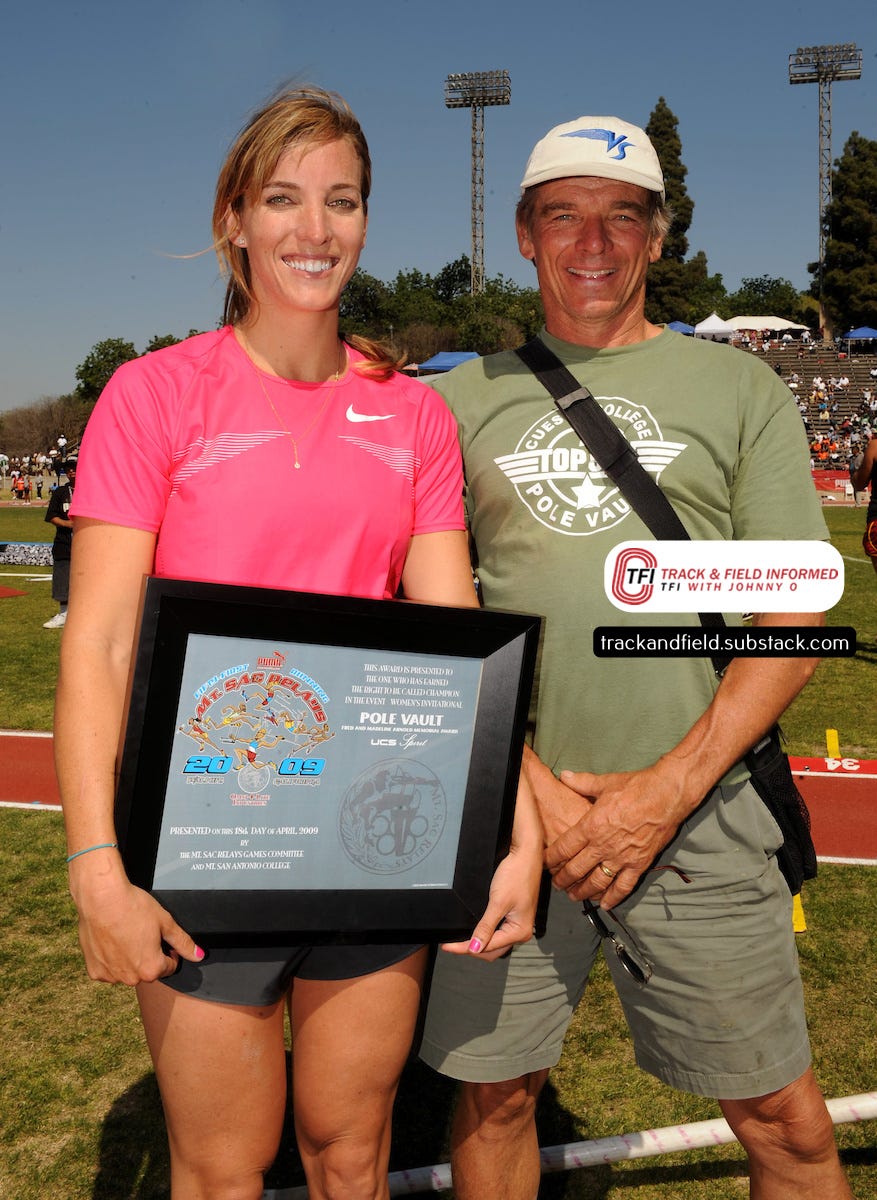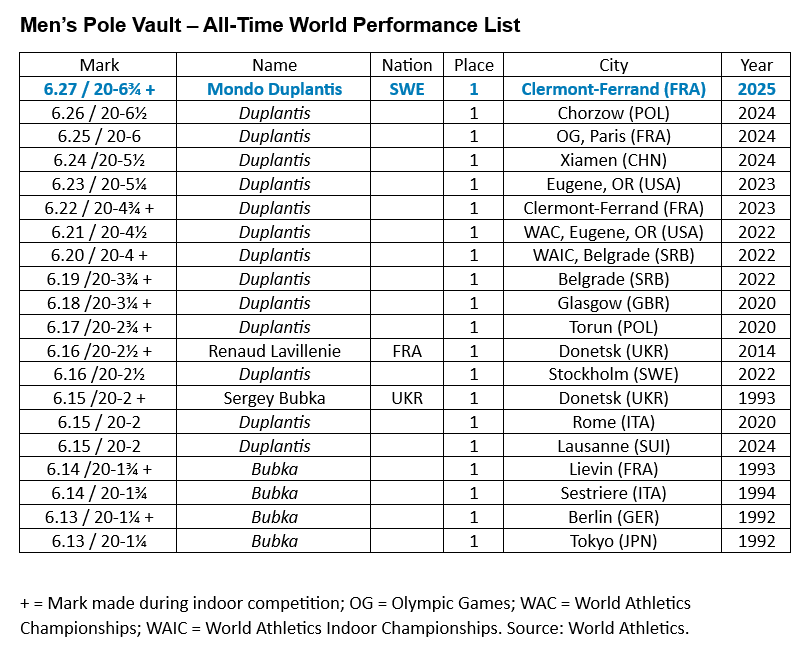Week in Review: Hoping for more
Duplantis set 11th world record of career last Friday, but did not try to jump higher
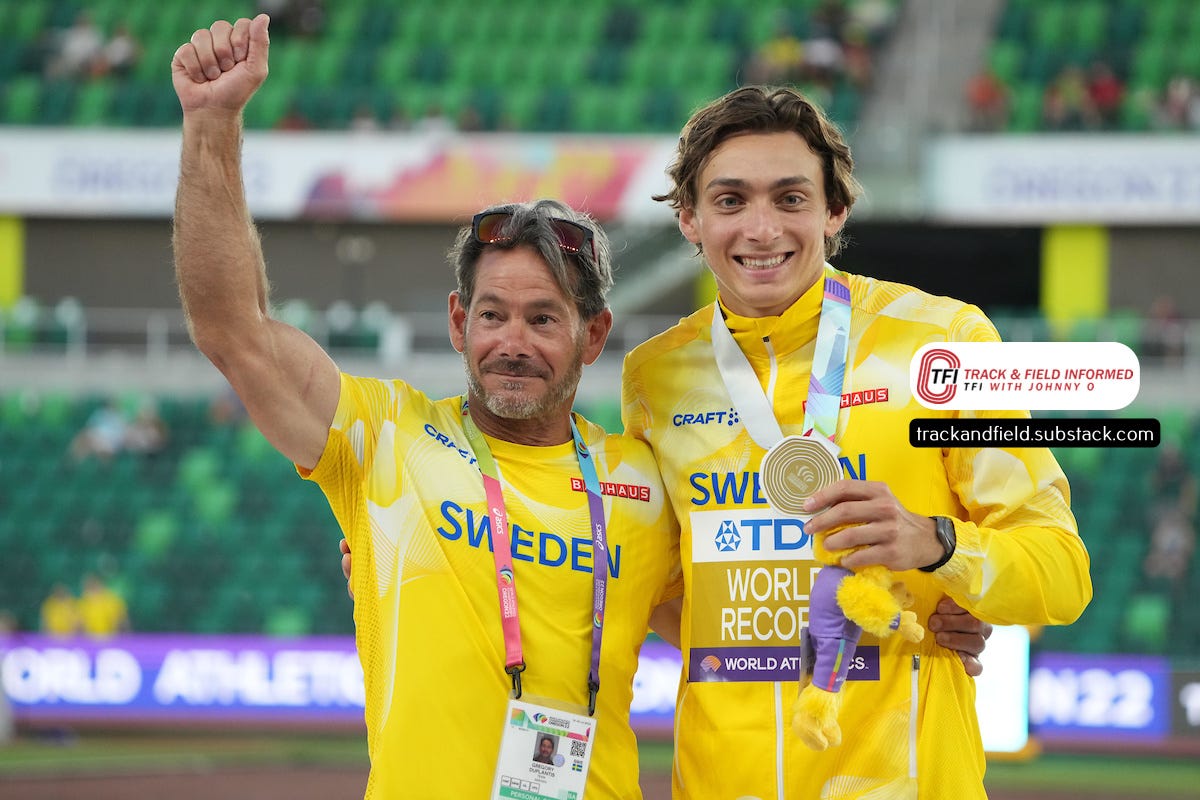
Call me a stickler, but I wish Mondo Duplantis would do more when it comes to setting world records in the men’s pole vault.
The 25-year-old Swede set the 11th global best of his career when he cleared 6.27 meters (20 feet 6¾ inches) on his first attempt in the All Star Perche meet in Clermont-Ferrand, France, last Friday. But he made no attempt to jump higher than that after adding a centimeter to the world record of 6.26 (20-6½) that he had set in the Kamila Skolimowska Memorial in Chorzow, Poland, last August.
His modus operandi has typically been to break a world record by a centimeter and then call it a day.
I realize he does this in order to maximize his financial earnings as he is awarded a bonus — often totaling $50,000 — each time he sets a world record. And I know that six-time World champion Sergey Bubka started the one-centimeter-at- a-time routine after he had raised the global best in the outdoor vault from 5.94 (19-5¾) to 6.00 (19-8) in 1985.
If this email appears clipped or truncated in your inbox, you should be able to click on “View entire message” to read it in its entirety.
Bubka, who won his first global title while competing for the Soviet Union in the inaugural World Championships in Helsinki in 1983 and his last in the ’97 meet in Athens while representing Ukraine, ended his career with a best of 6.15 (20-2 ) from the 1993 season.
Renaud Lavillenie of France raised that mark to 6.16 (20-2½) in an indoor meet in Donetsk, Ukraine, in 2014, and Duplantis bettered that record when he cleared 6.17 (20-2¾) in an indoor meet in Torun, Poland, in 2020.
Separate world records were kept for the men’s indoor and outdoor pole vault through the end of 1999. But World Athletics, which was previously known as the International Association of Athletics Federations, has made no distinction between indoor and outdoor marks when it pertains to world records since 2000.
I had the good fortune of being trackside when Duplantis cleared a global best of 6.21 (20-4½) in the 2022 World Athletics Championships in Eugene, Oregon. But the amount of clearance he had over that bar made it obvious he could have had a legitimate shot at making 6.25, or perhaps higher, that day if he had continued jumping.
Perhaps I’m overly romantic when it comes to athletics, but one of the things that first drew me to track and field in the early 1970s was that in its purest form, the sport involves performers pushing themselves to the limits of their physical capabilities. And I don’t get the feeling Duplantis is always doing that when he raises the world record by a centimeter and then moves on to vault another day.
What he does is spectacular and breathtaking, and I will always be in awe of the athleticism displayed by the world’s top pole vaulters as they practice their craft. But I miss the days when the world record was often raised by two, three or four centimeters at a time, and vaulters kept jumping until they could not go any higher.
As I admitted, I am a stickler.
Another high flyer: Molly Caudery of Great Britain posted her third victory in four meets this season when she cleared a season best of 4.85 (15-11) in the World Indoor Tour Gold Madrid 2025 meet in the Spanish capital last Friday.
The defending World indoor champion defeated a field that included second-place Tina Sutej of Slovenia, who cleared 4.70 (15-5), and third-place Imogen Ayris of New Zealand, who made 4.65 (15-3).
Caudery, 24, cleared 4.40 (14-5¼) on her first jump of the competition and followed that by making 4.55 (14-11), 4.65 (15-3), 4.70 (15-5), and 4.75 (15-7) on her initial efforts. She missed her first two attempts at 4.85 (15-11) before clearing the bar cleanly on her third try and retiring from the competition.
Caudery’s final clearance moved her to second on the yearly performer list that is topped by University of Washington sophomore Amanda Moll, who cleared a collegiate record of 4.91 (16-1¼) in the Big Ten Conference indoor championships in Indianapolis last Friday after having previously raised the college best to 4.88 (16-0) in the Don Kirby Elite Invitational in Albuquerque, New Mexico, on Feb. 15.
Coming up short: Yared Nuguse’s bid to regain the world record in the men’s indoor mile never really materialized in the Boston University Last Chance Indoor National Qualifier meet on Sunday when his winning time of 3:47.22 left him more than two seconds shy of the global best of 3:45.14 set by Jakob Ingebrigtsen of Norway in Lievin, France, on Feb. 13.
Nuguse, who had lowered the world record to 3:46.63 in the Millrose Games in New York City on Feb. 8, was in third place when first pacesetter Tim McInerney went through 409 meters in 56.88 seconds and he was in second when second pacemaker Mario Garcia Romo passed 809 meters in 1:54.09. He followed Garcia Romo for most of the ensuing lap before he took the lead just before passing 1,009 meters in 2:22.79.
The 25-year-old Nuguse then went through 1,209 meters in 2:51.15 and the 1,409 mark in 3:19.74 before covering the final lap in 27.48 seconds while recording the second-fastest-time of his career and the fifth-fastest effort in indoor history.
Olli Hoare of Australia finished second in 3:50.77 and he was followed by third-place Luke Houser of the U.S. in 3:51.14 and fourth-place Jack Antsey of Great Britain in 3:51.97.
Hoare, the 2022 Commonwealth Games 1,500 champion, was fairly close to Nuguse at the 1,209-meter mark. But he ran his final 400 in 59.05 while Nugusue clocked 56.07 for the last two laps of the 200-meter track.
Although Nuguse was unsuccessful in his bid to break the world record, he has run under 3:48.00 four times during the last three seasons and he has four of the nine sub-3:48 clockings ever indoors.
Big jump: While Yared Nuguse’s world-record attempt in the men’s mile garnered the most pre-meet attention prior to the Boston University Last Chance meet, Heather MacLean of the U.S. had a break-out performance in the women’s mile when her winning time of 4:17.01 bettered her previous best by more than six seconds and moved her to fourth on the all-time performer list.
The 29-year-old MacLean had posted her previous personal best of 4:23.32 in winning the New Balance Indoor Grand Prix on Feb. 2 before running 4:23.41 to finish second in the Millrose Games six days later.
She finished four and a half seconds ahead of her closest competitor on Sunday in a race in which first pacesetter Sage Hurta Klecker led the field through 409 meters in 61.78 seconds and second pacemaker Kate Mitchell was in front when she came through the 809 mark in 2:09:05.
MacLean moved into the lead after Mitchell dropped out, but she had Kenyan Susan Ejore for close company when she came through 1,209 meters in 3:13.10. However, MacLean’s lead had widened to a little more than a second over Ejore with a lap left in the race and she ended up finishing well ahead of second-place Sintayehu Vissa of Italy, who ran 4:21.51, and third-place Maia Ramsden of New Zealand, who timed 4:21.56.
Ejore placed fourth in 4:22.21, followed by Dorcus Ewoi of Kenya in 4:22.39 and Simone Plourde of Canada in 4:22.47.
Vissa and Ramsden set national records with their efforts and Ewoi and Plourde ran personal bests.
MacLean, who clocked 3:59.60 at 1,500 meters, ran her final 200 in 31.64 and her last 400 in 63.91 as she came within sixth tenths of a second of the U.S. record of 4:16.41 in the mile set by Elle St. Pierre last year.
In a post-race interview on flotrack.org, she said her single goal had been to meet the qualifying standard of 4:03.00 for the 1,500 for the World Indoor Athletics Championships in Nanjing, China, from March 21-23.
“I’m super excited,” she said. “My only goal today was to go for the world standard… So I’m very pleasantly surprised.”

Another big step: A little more a year after he had become the first collegian to run under 13 minutes for 5,000 meters, Nico Young became the fifth-fastest performer in history when he ran 12:51.56 to win the event in the Boston University Last Chance meet.
Young had finished a close second to South African Adriaan Wildschutt when he clocked a collegiate record of 12:57.14 while running for Northern Arizona University in the second section of the Boston University John Thomas Terrier Classic in January of last year. But the 22-year-old American turned the tables on Wildschutt on Sunday when he surged into the lead with a little more than five laps to go and proceeded to run the last kilometer of the race in 2:28.09.
Wildschutt finished second in 12:55.02 and he was followed by Ky Robinson of Australia in 13:02.34, Dylan Jacobs of the U.S. in 13:07.89, and Drew Hunter of the U.S. in 13:17.35.
Wildschutt’s time was a national record, while Robinson, Jacobs, and Hunter all set personal bests.
As he often does, Young had stayed toward the back of the lead pack for the first part of the race in which Yared Nuguse paced the field through 1,600 meters in 4:08.02, Olli Hoare led at two kilometers in 5:10.13, and Anthony Camerieri clocked 7:45.80 at three kilometers and 9:19.21 at 3,600 meters before dropping out.
Robinson took over the lead at that point, followed by Young and Wildschutt.
The South African moved into first place during the 20th lap of the race, but Young moved to the front for the first time with just over a kilometer left and proceeded to run his last five laps in 30.32 seconds, 30.00, 29.90, 29.32, and 28.55.
Young said in a flotrack.org interview that his top priority had been to meet the qualifying standard of 13:01.00 for the World Athletics Championships in Tokyo from Sept. 13-21, and “anything under that was a bonus so I was thrilled with today.”
He later revealed that he had experienced some hiccups in his training prior to the start of the indoor season as he had been ill at one point and he also had to take it easy for about a week after a dog bit him in the quadriceps while he was on a run.
Another global-leading run: Like Heather MacLean in the women’s mile, Josette Andrews of the U.S. posted a yearly world-leading mark in the women’s 5,000 meters when she clocked a personal best of 14:44.80 in the Boston University Last Chance meet.
Her time bettered the previous yearly best of 14:48.51 set by fellow American Whittni Morgan on the same Boston University Track & Tennis Center oval four weeks earlier. It also came in a race in which a hard-charging Emily MacKay of the U.S. placed second in 14:45.81.
Lauren Ryan of Australia finished third in 15:05.68, followed by the American duo of Katelyn Tuohy in 15:07.27 and Olivia Markezich in 15:14.42.
The 29-year-old Andrews and the 26-year-old MacKay moved to second and third on the all-time U.S. performer list with their times, while Ryan, Tuohy, and Markezich each set personal bests.
Sintayehu Vissa, who had set an Italian record of 4:21.51 while finishing second in the mile earlier in the meet, paced the 5k field through the first kilometer in 2:56.96 and the second in 5:54.10.
Maia Ramsden, third in the mile in a New Zealand record of 4:21.56, proceeded to bring the field through 2,400 meters in 7:05.06 before dropping out.
Markevich ran at the front for another two laps before Andrews took over on the 15th lap and came through three kilometers in 8:53.69.
Andrews had dropped everyone but MacKay when she passed 4,000 meters in 11:50.28.
She appeared to have put MacKay away when she came through 4,400 meters with a lead of nearly two and half seconds. But MacKay, the bronze medalist in the 1,500 in last year’s World indoor championships, made up ground on Andrews during the 23rd lap before trailing her by more than two seconds with a lap to go.
However, she made one more run at Andrews during the final 200 meters to finish just over a second behind her.
Andrews’ time of 14:44.80 bettered her previous best of 14:46.81 from last year, while MacKay’s 14:45.81 crushed her personal best of 15:44.93 from 2021.
Andrews said in an interview on flotrack.org that she was pleased to have bettered the qualifying standard of 14:50.00 for the World Athletics Championships in Tokyo from Sept. 13-21.
“I’m really happy to get that done” she said. “I knew this was going to be a really hard battle, like mentally and physically, for how small the field was.”
She then credited her On Athletics Club teammates, Vissa, Ramsden, and Markevich with helping to pull her through the first 2,800-plus meters of the race.
“I couldn’t have done it without having that help through the first 2k, or whatever it was,” she said.
Three for three: Graham Blanks of the U.S. set his third personal best of the indoor season when he won the men’s 3,000 meters in 7:29.72 in the Boston University Last Chance meet.
Blanks’ time slashed 15-plus seconds off his previous best of 7:44.76 that he set in 2023 while moving him to fourth on the all-time U.S. performer list. The effort came four weeks after he had run a personal best of 3:36.11 to finish fifth in the New Balance Indoor Grand Prix and nearly three months after he had lowered his career in the 5,000 to 12:59.89 in winning that event in the Boston University Sharon Colyear-Danville Season Opener on Dec. 7.
Blanks, who had won his second consecutive NCAA cross country title for Harvard last November before turning pro shortly after his sub-13 clocking in the 5,000, was in second place when pacesetter Kasey Knevelbaard came through the first kilometer in 2:30.32 and the second kilometer in 5:00.26.
He then took the lead after Knevelbaard dropped out and proceeded to run the last 1,000 meters of the race in 2:29.25.
Valentin Soca of Uruguay and Kieran Lumb of Canada were not far behind Blanks with a kilometer left in the race, but Blanks began to leave them behind when he ran the 11th lap of the race in 29.89 seconds.
He then ran 30.01, 30.21, 29.83, and 29.31 for final four circuits of the track to finish well clear of second-place Soca, who set a Uruguayan record of 7:34.10.
Sam Gilman and Matthew Wilkinson of the U.S. finished third and fourth in personal bests of 7:34.69 and 7:37.01, respectively, and Lumb was fifth in 7:44.67.
Four for four: After setting personal bests in his previous three races while running on the 307-meter oval at the University of Washington’s Dempsey Indoor arena, Aidan McCarthy of Cal Poly San Luis Obispo ran 1:45.19 in winning the 800 in the Boston University Last Chance meet,
The senior’s time topped his previous best of 1:46.26, which he had run outdoors in 2023, and moved him to third on the all-time collegiate indoor performer list.
McCarthy was in second place when teammate Chase Walter paced the field through the first 200 meters in 25.64 seconds and the 400 in 51.55. He took the lead after Walter dropped out and timed 1:18.33 at 600 meters before running his final lap in 26.86 seconds.
John Rivera finished second in a Puerto Rican record of 1:45.32 and Robert Heppenstall of Canada placed third in a personal best of 1:46.04.
McCarthy began his streak of indoor personal bests when he 2:19.68 in winning the 1,000 in the UW Preview meet on Jan. 17, and he followed that with a second-place time of 1:46.55 in the 800 in the UW Invitational on Feb. 1, and a fifth-place effort of 3:52.83 in the mile in the Husky Classic on Feb. 15.
Raising the bar: Sophomore twins Amanda and Hana Moll of the University of Washington put on a superb display of pole vaulting prowess when they finished first and second in the Big Ten Conference indoor championships in Indianapolis last Friday.
Amanda Moll set a collegiate-record and yearly world-leading height of 4.91 (16-1¼) in the meet at Fall Creek Pavilion, but she had trailed Hana for most of the competition until that point.
Hana, who finished second at 4.86 (15-11¼), and Amanda had each cleared 4.36 (14-3½) and 4.46 (14-7½) on their first two jumps of the competition. But defending NCAA indoor champion Hana had taken the lead when she made 4.56 (14-11½) on her first attempt and Amanda needed two tries to make that height.
With no one else left in the competition, they each passed at 4.61 (15-1½) before Hana made 4.66 (15-3½) on her first attempt and Amanda needed two tries.
After passing at 4.71 (15-5½), they each made 4.76 (15-7¼) and 4.81 (15-9¼) on their initial tries before passing at 4.86 (15-11¼).
Amanda trailed Hana at that point in the competition because of her two previous misses, but she took the lead when she made 4.91 (16-1¼) on her first attempt and Hana missed her initial try.
After Hana missed her final two attempts, Amanda had the bar moved to 5.00 (16-4¾). Although she was unsuccessful on all three of her tries at that height, her clearance at 4.91 topped the previous collegiate record of 4.88 that she had set two weeks earlier and moved her into a four-way tie for eighth on the all-time performer list.
Hana Moll moved to second on the all-time collegiate list with her 4.81 clearance and she now sits at eighth on the all-time U.S. list. In addition, she is second on the yearly world list.
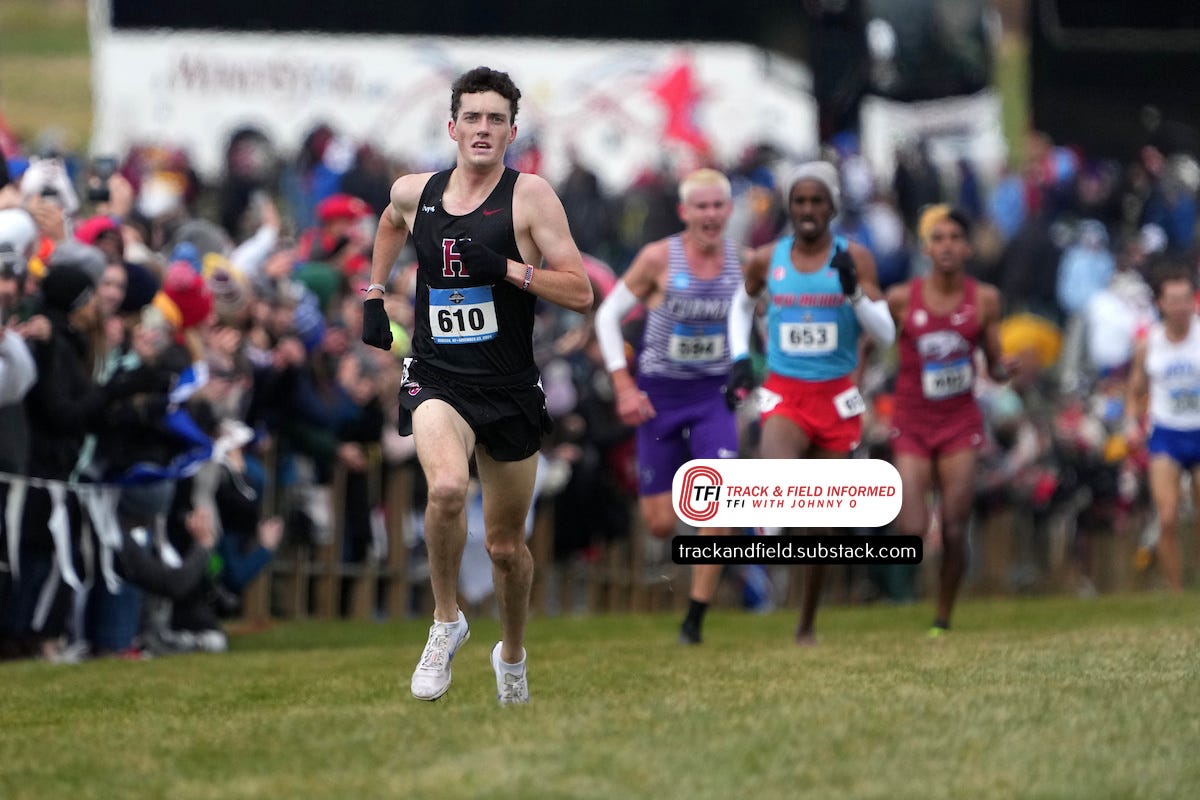
Moving past a big name: Senior Tacoria Humphrey of the University of Illinois moved to third on the all-time collegiate indoor performer list in the women’s long jump when she leaped 6.94 (22-9¼) in the Big Ten championships last Saturday.
Humphrey’s effort put her a centimeter ahead of Tara Davis on the all-time college list, as the woman who won the Olympic and World indoor titles last year had leaped a then-collegiate record of 6.93 (22-9) in the 2021 NCAA championships while competing for Texas.
Tara Davis changed her name to Tara Davis-Woodhall in October of 2022 when she and Hunter Woodhall were married.
Humphrey fouled on her first attempt of the competition on Saturday before she raised her personal best to 6.83 (22-5) in the second round. She then fouled on her third attempt, leaped 6.55 (21-6) on her fourth, and fouled on her fifth before hitting 6.94 (22-9¼) on her final jump.
Defeating the collegiate record-holder: Junior Alexlina Johansson of the University of Nebraska and Sweden moved to fourth on the all-time indoor collegiate performer list in the women’s shot put when she won the event with a best of 19.31 (63-4¼) in the Big Ten Conference championships last Saturday.
Johansson’s effort was a Swedish indoor record and gave her a large margin of victory over senior Jaida Ross of Oregon, who finished second at 18.47 (60-7¼).
Ross had raised the collegiate outdoor record to 20.01 (65-7 ¾) last year and capped her season with a fourth-place finish in the Olympic Games.
Johannsson unleashed her big put in the sixth round after her previous efforts had measured 17.41 (57-1½), 18.08 (59-4), 18.30 (60-½), 18.91 (62-½), and 18.34 (60-2).
A pair of sub-50 efforts: Junior Aaliyah Butler of the University of Georgia and senior Isabella Whittaker of Arkansas became the second and third collegiate women in history to break 50 seconds in the 400 meters indoors when they ran 49.78 and 49.90, respectively, while finishing 1-2 in the Southeastern Conference championships in College Station, Texas, last Saturday.
Those times moved Butler and Whittaker to second and third on the all-time collegiate lists behind Britton Wilson, who won the 2023 NCAA indoor title in 49.48 for Arkansas.
Their efforts also made them the second- and third-fastest Americans in history and moved them to sixth and seventh on the all-time world performer list.
Butler, who finished third in the 400 in the U.S. Olympic Team Trials last year, had lowered her indoor best to 50.59 in her qualifying heat on Friday before clocking 23.41 seconds for the first lap of the 200-meter track in the final on Saturday.
Sophomore Kaylyn Brown of Arkansas was in second place when she completed the first lap in 23.77, but Whittaker (23.87) overtook her heading down the final backstretch and made up ground on Butler during the remainder of the race at Texas A&M’s R.A. Fasken Indoor Track Stadium.
Brown’s third-place time of 50.70 was the fastest she has ever run indoors.
Butler followed up her victory in the 400 by running a 49.87-second anchor leg in the 4 x 400 relay that gave Georgia a come-from-behind victory over South Carolina.
The winning time of 3:26.42 produced by the quartet of Dejanea Oakley, Michelle Smith, Haley Tate, and Butler made Georgia the sixth-fastest collegiate school ever.

Quality competition: Senior Pippi Lotta Enok of the University of Oklahoma won a tight contest with freshman Sofia Iakushina of Texas A&M in winning the pentathlon on the first day of the SEC championships a week ago Thursday.
Enok totaled 4,593 points, followed by Iakushina with 4,556, and Angel Richmore of Oklahoma with 4,271.
Enok’s Estonian record moved her to fifth on the all-time collegiate performer list and Iakushina’s mark puts her at tenth.
Enok was in a tie for third place in the standings after running 8.46 seconds in the 60-meter hurdles, but she took the lead after clearing 1.81 (5-11¼) in the high jump.
Richmore moved into first place after her top effort of 14.60 (47-10¾) in the shot put earned her 130 more points in the event than Enok, who had a best of 12.64 (41-5¾). However, Enok regained the lead for good when her 6.40 (21-0) best in the long jump gave her a 53-point lead over Iakushina heading into the 800 meters, the pentathlon’s final event.
Iakushina picked up 16 points on Enok when she won the event in 2:13:59 and the Estonian finished second in 2:14.72, but that was not enough to overtake her in the standings.
In addition to her performance in the 800, Iakushina produced marks of 8.39 seconds in the 60 hurdles, 1.78 (5-10) in the high jump, 12.11 (39-8¾) in the shot put, and 6.42 (21-¾) in the long jump.
Another continental best: Senior Nathaniel Ezekiel of Baylor lowered the African indoor record in the men’s 400 meters for the second time this season when he clocked 44.74 seconds in winning the event in the Big 12 Conference championships in Lubbock, Texas, last Saturday.
The Nigerian’s time left him .21 seconds in front of sophomore Jayden Davis of Arizona State, who ran 44.95, and moved him to sixth on the all-time collegiate performer list and to eighth on the all-time world list.
Ezekiel ran a personal best of 48.00 in the 400 intermediate hurdles in winning the Big 12 Conference title last year before finishing third in the NCAA outdoor meet for the second year in a row. He ran the intermediate hurdles for Nigeria in the Olympic Games in Paris and was eliminated in the semifinals.
In addition to his victory in the 400 on Saturday, he also ran a 45.28-second anchor leg on a 4 x 400 relay team that placed first in 3:04.78.
Freshman Tyler Honeyman ran 47.40 on the opening leg for Baylor and he was followed by graduate student Demar Francis, who was credited with a split of 45.35, and senior Dillon Bedell, who clocked 46.75.
Two liners: Senior Makanakaishe Charamba of Auburn University moved into a tie for sixth on the all-time collegiate performer list when he won the men’s 200 meters in the Southeastern Conference indoor championships in College Station, Texas, last Saturday. His time bettered his previous Nigerian record of 20.16 and moved him into a tie for seventh on the all-time world list. . . . . . . . Sophomore JaKobe Tharp of Auburn moved into a tie for sixth on the all-time collegiate performer list in the men’s 60-meter high hurdles when he ran 7.48 in winning the SEC title last Saturday. Junior Ja’Qualon Scott of Texas A&M finished second in 7.51 to move into a three-way tie for 12th on the all-time collegiate list. . . . . . . . Freshman Paityn Noe of the University of Arkansas moved to seventh on the all-time collegiate list in the women’s 5,000 meters when she ran 15:11.27 while winning the SEC title a week ago last Thursday. Noe, who finished seventh in the NCAA Cross Country Championships in November, slashed 12-plus seconds off her previous best of 15:23.41 that she had set in finishing seventh in the Boston University Sharon Colyear-Danville Season Opener in December. . . . . . . . Defending NCAA indoor champion Rachel Glenn of the Arkansas cleared 1.98 meters (6 feet 6 inches) in winning the women’s high jump in the SEC championships last Friday. The Razorback junior cleared 1.98 on her first attempt before missing three times at 2.01 (6-7), a height that would have added a centimeter to the collegiate indoor record of 2.00 (6-6¾) that was first set by Lamara Distin of Texas A&M in last year’s SEC meet and equaled by Glenn in the NCAA championships. . . . . . . . Junior Gary Martin of the University of Virginia moved to seventh on the all-time collegiate performer list in the men’s 3,000 meters when he won that event in 7:36.69 on the third and final day of the Athletic Coast Conference indoor championships in Louisville, Kentucky, on Monday. Martin had previously finished second in the 5,000 last Saturday when senior Ethan Strand of North Carolina ran 13:26.60 to Martin’s 13:30.69. . . . . . . . Defending NCAA champion Jadin O’Brien of Notre Dame totaled 4,580 points in winning the pentathlon in the ACC championships last Saturday. The senior produced marks of 8.17 seconds in the 60-meter hurdles, 1.70 (5-7) in the high jump, 14.45 (47-5) in the shot put, 6.15 (20-2¼) in the long jump, and 2:13.50 in the 800 while moving into a tie for seventh on the all-time collegiate performer list.

Contrasting victories: Tadese Takele and Sutume Kebede of Ethiopia used different tactics in winning the men’s and women’s titles in the Tokyo Marathon on Sunday.
The 22-year-old Takele broke away from his two closest rivals prior to the 39-kilometer mark while on his way to a personal best of 2:03:23 that left him comfortably ahead of compatriot Deresa Geleta, who finished second in 2:03:51, and Kenyan Vincent Ngetich, who placed third in 2:04:00.
In contrast, the 30-year-old Kebede won her second consecutive women’s title in 2:16:31 after roaring to a huge lead during the first 35 kilometers of the race and then finishing 25 seconds ahead of second-place Winfridah Moseti of Kenya, who ran 2:16:56, and third-place Hawi Feysa of Ethiopia, who time 2:17:00.
In a postrace interview on FloTrack, Takele said through an interpreter that he felt “great about this win. I came here really well prepared and I performed better than expected.”
Takele, who had represented Ethiopia in the 3,000-meter steeplechase in the 2021 Olympic Games in Tokyo when he was 18, was part of a large lead pack on Sunday when he went through 10 kilometers in 28:56 and he was one of 11 men — counting two pacesetters — at the front of the race when he clocked 58:07 at 20 kilometers.
The lead group had dwindled to four when pacesetter Shadrack Kimining of Kenya clocked 1:27:21 at 30 kilometers while running just ahead of Ngetich, Takele, and Geleta.
Defending champion Benson Kipruto of Kenya, who had set a course record and personal best of 2:02:16 in last year’s race, was 11 seconds out of the lead at that point and he would end up finishing in sixth place in 2:05:46.
In addition, Joshua Cheptegei of Uganda, the Olympic champion in the 10,000 meters and a three-time world champion in that event, was part of a chase group that was 75 seconds out of the lead at that juncture. He would finish ninth in 2:05:59.
After Kimining dropped out after 30 kilometers, Ngetich, Takele, and Geleta ran together for the next eight-plus kilometers before Takele began to pick up the pace. Ngetich fell back fairly quickly after that and a gap began to open between Takele and Olympic fifth-place finisher Geleta about a minute and a half later.
Takele had an 11-second lead over Geleta when he passed the 40-kilometer mark in 1:56:59 and he more than doubled his advantage during the remainder of the race as he posted his first victory while running in the third marathon of his career.
Kebede had set a course record — and personal best — of 2:15:55 in last year’s race and she seemed to be intent on destroying it when she clocked 31:22 for the first 10 kilometers and 1:02:53 for 20 kilometers. Although her pace slowed ever so slightly during the next five kilometers, her projected finishing time was still 2:12:52 when she came through the 25k mark in 1:18:42.
However, her tempo slowed more significantly after that as her splits for the next three five-kilometer segments of the race were 16:01, 16:31, and 17:20 after she had run 15:50 from 20-25 kilometers.
Her pace slowed even further during the remainder of the race, but her lead had been large enough after 35 kilometers that her victory was never in doubt.
“I’m really happy,” Kebede said through an interpreter. “It felt great to win Tokyo for a second year. I couldn’t improve my time, but I’m still pretty happy.”
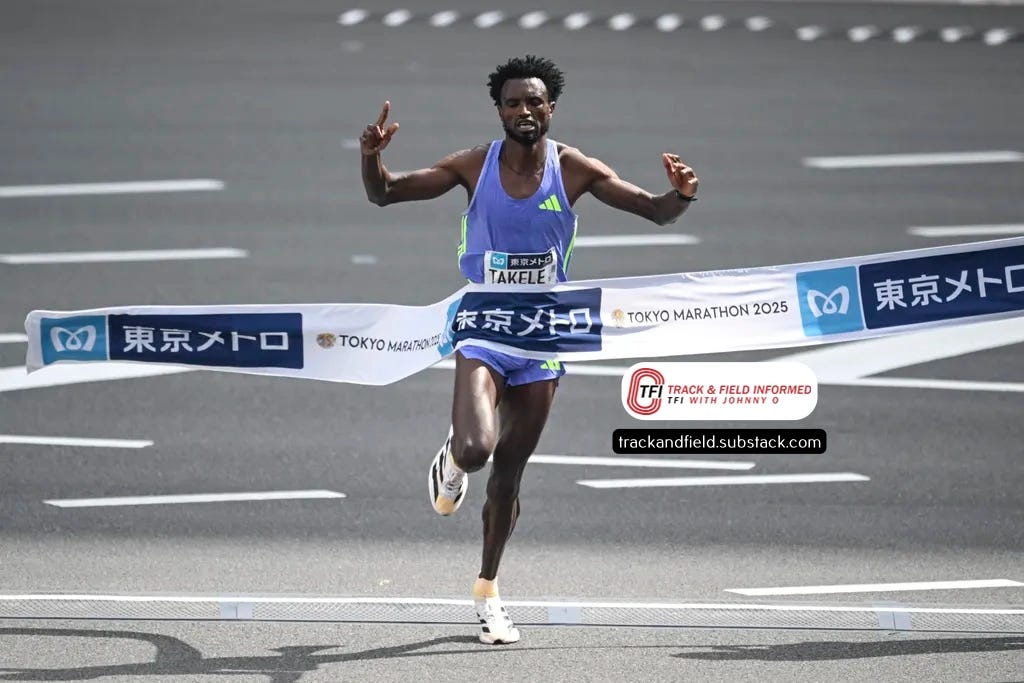
Fast finishes: Wang Zhaozhao of China and Jemima Montag of Australia won the men’s and women’s titles in the Chinese Race Walking Grand Prix in the Chinese city of Taicang on Saturday.
It was the year’s first gold-level event of the World Athletics Race Walking Tour.
Massimo Stano of Italy threw caution to the wind in the men’s race and he led the chase pack by more than 30 seconds when he went through five kilometers in 19:09.
The 2021 Olympic champion was still in lead when he came through 10 kilometers in 38:44, but his pace was slowing and the Chinese quartet of Wang, Qian Haifeng, Cui Lihong, and 19-year-old Li Chenjie caught up to him during the 16th kilometer of the race.
Stano soon fell back of the lead foursome and it had become a two-man race for first place between Wang and Cui by the 18-kilometer mark.
Those two stayed together until the 25-year-old Wang surged into the lead in the final 100 meters of the race to record a personal best of 1:17:30 and a three-second margin of victory.
Qian and Li also recorded career bests of 1:17:58 and 1:18:04 while finishing third and fourth, respectively.
Olympic silver medalist Caio Bonfim of Brazil placed sixth in 1:18:20, followed by Stano in 1:18:28.
“The competition against Cui in the final two kilometres was so tight. For some moment, I even thought I could not keep my pace any longer,” Wang said in a World Athletics post. “But I made it. My speed gave me the edge in the last 100m.”
With the women’s race starting an hour and 50 minutes after the men’s, rising temperatures had a bigger impact on the proceedings. However, Olympic bronze medalist Montag dealt well with the conditions and her time of 1:27:20 left her eight seconds ahead of second-place Li Ma of China, who recorded a personal best of 1:27:28.
Yuxia Shi of China also timed a personal best when she finished third in 1:27:41. She was followed by Olympic silver medalist Sandra Arenas of Colombia in 1:28:16.
The 27-year-old Montag was amongst the leaders throughout the race and the battle for first place was down to her and Ma until she pulled away from her Chinese rival late in the contest to remain unbeaten in four races this season.
“The temperate is higher than we expected, but in Australia now it’s summer, so maybe we are used to it,” Montag said. “It’s a good time (today) and good practice for the World Championships. We know in Tokyo it will be hot weather, so we will practice in the heat in Australia.”
More stars added to mix: Emmanuel Wanyonyi of Kenya, the winner of the men’s 800 meters in the Olympic Games in Paris last summer, is scheduled to compete in the inaugural Grand Slam Track meet in Kingston, Jamaica, from April 4-6.
The 20-year-old Wanyonyi will be one of four “challengers” who will compete in the men’s short distance category during the meet, which will require participants to run in both the 800 and 1,500 during the three-day competition.
Bryce Hoppel of the U.S. will also be a challenger in the short distance category after winning the 800 in the World Athletics Indoor Championships last year and finishing fourth in the Olympic Games.
The four “racers” in the men’s short distance category are Cole Hocker and Yared Nuguse of the U.S., Josh Kerr of Great Britain, and Marco Arop of Canada.
Hocker, Kerr, and Nuguse finished 1-2-3 in the 1,500 in Paris and Arop won the silver medal in the 800 while finishing a hundredth of a second behind Wanyonyi.
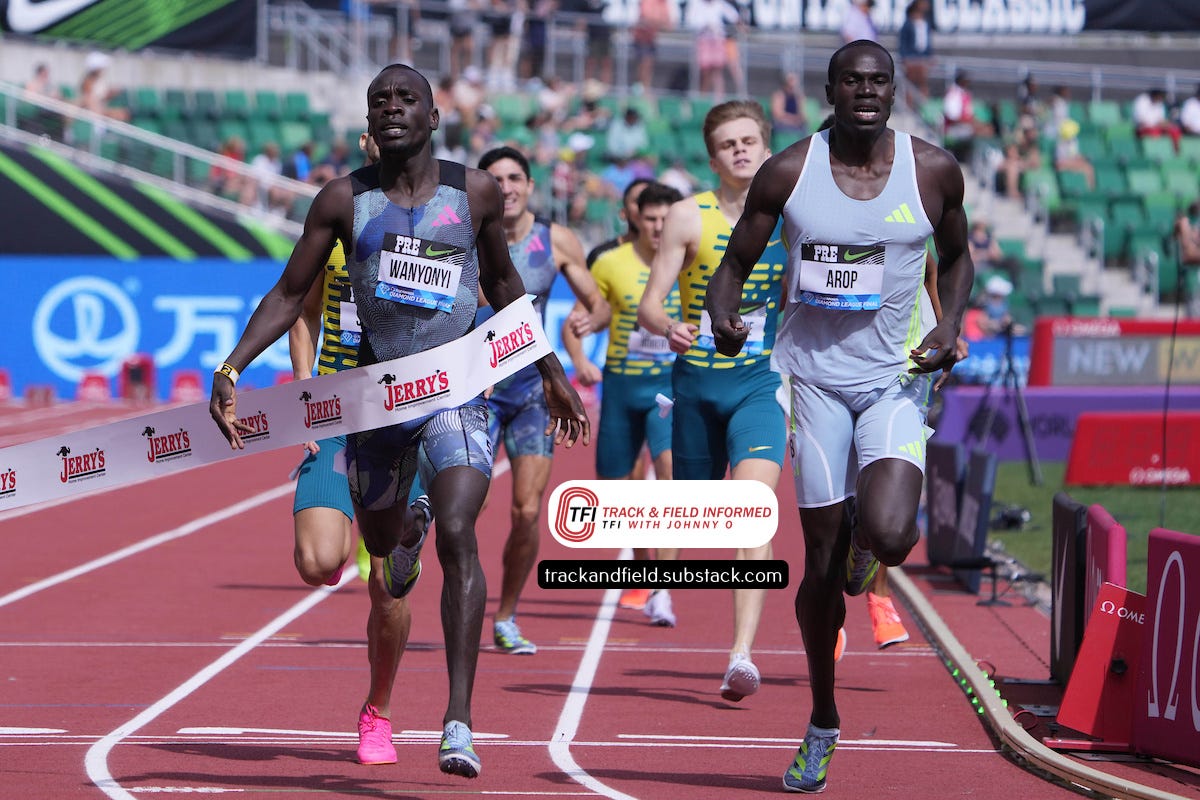
Racers are athletes who have signed contracts to compete in all four Grand Slam Track meets this year, while challengers are performers who will be brought in to run on a meet-by-meet basis.
No matter their status, all eight competitors in each category will have the opportunity to win $100,000 in prize money during each Grand Slam Track meet, with the final standings being determined by points based on their finishes in each of two events.
Hansle Parchment and Danielle Williams are two of six Jamaicans who are scheduled to compete as challengers in the meet in Kingston.
Parchment won the men’s 110-meter high hurdles in the 2021 Olympic Games in Tokyo and he was a silver medalist in the 2023 World Championships in Budapest, Hungary.
Williams won world titles in the women’s 100 hurdles in 2015 in Moscow and in ’23.
Parchment and Williams will compete in the men’s and women’s short hurdles category in which competitors will run in the straightaway hurdles, as well as in the 100 meters.
You can click here for more information about Grand Slam Track, including how to purchase tickets.
In memory: Jan Johnson, the bronze medalist in the men’s pole vault in the 1972 Olympic Games in Munich, died on Feb. 23 in Atascadero, California. He was 74.
Johnson, a native of Hammond, Indiana, grew up on the south side of Chicago and set a world indoor record of 5.36 (17-7) while he was competing for the University of Kansas in 1970 and he later transferred to Alabama, a program for which he won two NCAA titles.
Johnson’s world record was set in the 1970 NCAA outdoor championships when inclement weather forced the pole vault to be contested indoors.
He was the gold medalist in the 1971 Pan American Games in Cali, Colombia, and he was the No. 4-ranked vaulter in the world by Track & Field News that year. He was ranked fifth in 1972 after finishing third in the Olympic Games behind Wolfgang Nordwig of East Germany and defending champion Bob Seagren of the U.S.
That marked the first time in Olympic history that an American had not won the pole vault.
Although the free-spirited Johnson would not be ranked among the top 10 performers in the world again, he was involved in the pole vault for the rest of his life as a coach and also as a safety proponent for the event.
He founded Sky Jumpers Vertical Sports Club in Atascadero and while he worked with hundreds of high school pole vaulters through the years, he also guided his daughter, Chelsea, to a silver medal in the 2009 World Championships.
American Dean Starkey won a bronze medal in the men’s pole vault in the 1997 World Championships while working with Johnson, who is also credited with helping Greg Duplantis clear 19 feet (5.79 meters) for the first time in his career in 1988.
Duplantis is the father — and coach — of Mondo Duplantis, the winner of the last two Olympic titles for Sweden and a man who set the 11th world record of his career last week when he cleared 6.27 (20-6¾).
